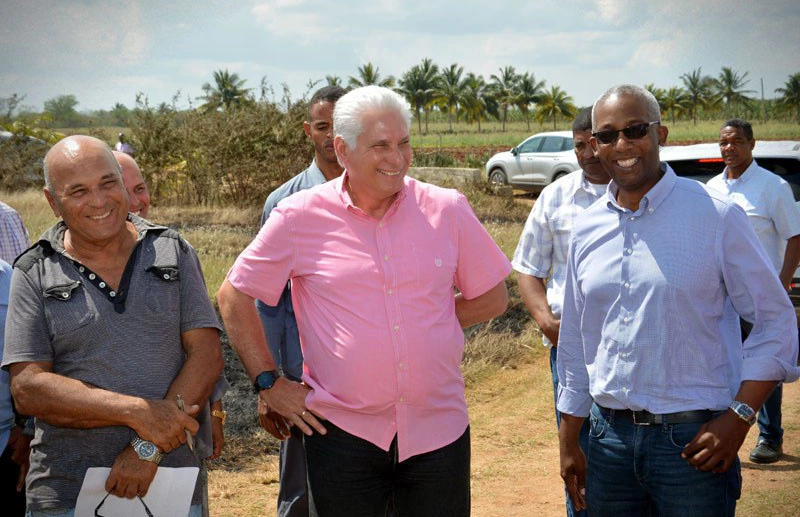Rescuing the community agricultural tradition with the use of land for the cultivation of fruit trees and rainfed planting is a priority, said the President of the Republic, Miguel Díaz-Canel, in the province of Holguin.
As part of his tour of the country’s socioeconomic interests, the president toured the municipalities of Cueto, Báguano and Urbano Noris, where he emphasized agricultural production for the advancement of the Food Sovereignty Plan, so that it contributes to the supply of the people.
In an exchange with the workers of the “Manuel Rodríguez Fuentes“ productive pole, known as Limoncito, he advocated taking advantage of the climatic conditions of Holguin‘s geography, prone to extensive periods of drought, in favor of the production of root vegetables and grains that do not require large volumes of water.
The president pointed out the importance of the application of science in this task, in which every Cuban must participate, since it is a guarantee of their food in the midst of a complex context for the import of resources and characterized by price inflation.
Luis Rodríguez Tamayo, head of the front that works in Limoncito, validated the joint efforts of peasants, usufructuaries, organizations such as the Central de Trabajadores de Cuba and others in the recovery of more than 570 hectares that will be used for various crops, of which 37 have already been planted with corn, cassava and fruit–bomb.
The head of state arrived at the popular council of Marcané, located in the territory of Cuetense, who was interested in the alternatives applied by the Pig Center, belonging to the Basic Business Unit Tecnoazúcar, in order to optimize the work aimed at the contribution of meat to the sugar sector.
Fernando Rosabal Tamayo, head of charge of the entity, reported that given the difficulty of acquiring inputs for the fattening mass, which exceeds 285 heads, they created a farm of 88 hectares of extension and use another 13, corresponding to the area adjacent to the premises, for agriculture.
From these they have obtained soybeans and corn used as fodder, as well as sweet potatoes, plantains and pumpkins, which are processed in a native feed plant that, mixed with fish waste, represents 35 percent of the resources for animal sustenance, which allowed the reduction of costs.
Díaz-Canel learned that the development of this practice not only favors the diversification of nutritional sources oriented to pig farming, but that part of what is collected is destined for the self-consumption of the workers, so he urged to generalize these experiences.
The work agenda included a visit to the UEB Derivados Urbano Noris and the Fernando de Dios de Báguano sugar mill, the only one that will grind in the current sugar harvest, in which he pointed out the need for dignified attention to man and was informed about the fulfillment of production and efficiency indicators, as well as problems that affect them.
Cuban President Roberto Morales Ojeda, member of the Political Bureau and Secretary of Organization of the CCPCC; Joel Queipo Ruiz, member of the CCPCC and first secretary of the Provincial Committee of the PCC in Holguin; Manuel Francisco Hernández Aguilera, Governor, among other political and governmental authorities.
With information from Claudia Laura Rodríguez Zaldívar/Agencia Cubana de Noticias/ Translated by Radio Angulo
- Installation of Photovoltaic Systems in Rural Communities in Holguin - 19 de January de 2026
- 39th City Salon Opens in Holguin - 19 de January de 2026
- Habanos Festival Among Cuba’s Most Important Tourism Events - 19 de January de 2026

